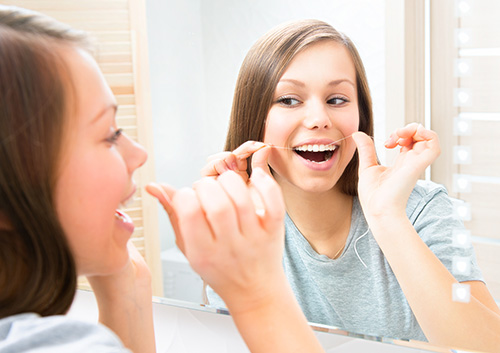November 10th, 2016

Our green office offers many benefits to patients. And just because we’ve gone green doesn't mean that we won't be able to provide the same services as a traditional office. In fact, our goal is to provide the same (or better) services as a regular office, but services that act in harmony with the body and world around us. Less waste, fewer chemicals and heavy metals, and reduced energy consumption; these are traits that define a truly green office.
Some of the benefits you'll experience as a patient at our green Cedar City or Kanab, UT office include:
- Better air quality – There's a focus on using renewable and natural building materials, paint that is free of volatile organic compounds (VOCs), biodegradable cleaning supplies, and formaldehyde free materials for cabinetry. This leads to cleaner air in the office for patients and their families.
- Less radiation – Digital X-rays replace old film based X-rays and expose patients to 90 percent less radiation. Digital X-rays are also convenient for patients since their images can be viewed right on the computer screen instead of on a physical printout.
- No need for paper – Many offices have gone "paperless." You'll get any pertinent paperwork via email, reducing paper waste and saving you time. Patient records are also stored digitally, doing away with the wall of patient folders and making for easier and quicker record retrieval.
- Fewer chemicals – Green offices take advantage of chemical-free sterilization by steam and clean their tools using energy-efficient washers and dryers. Biodegradable cleaning solutions instead of toxic chemical cleaners are used around the office, too.
- Reduced heavy metal exposure – Biocompatible, non-allergenic, non-metal materials like porcelain and ceramic are preferred in a green office over the heavy metals (nickel, titanium) used in traditional offices. This is particularly important in the case of appliances that are used over long periods of time, like dental implants or veneers.
Dr. Mark Webster and our team hope you realize the positive effect a green office can have on your health, as well as that of the environment. Our office is dedicated to bringing you the cleanest, safest, and greenest technologies the industry has to offer, and we're happy to share how our processes differ from other offices!
November 3rd, 2016

Dental floss is similar to a lot of products that depend mainly on the consumer’s preference. Fact is, floss comes in a wide variety of flavors, coatings, and other variations, but all types of floss essentially do the same thing. After all, that is what is most important: that the dental floss you buy is functional—cleaning the areas in between your teeth. If you want to know what the best dental floss is, the answer is the kind that enables you to successfully and regularly clean those areas. So to help you find the right type of floss for you, here are some options.
Flavored Dental Floss
Many people that floss prefer a flavored dental floss because it freshens their breath even more than unscented floss. The latter can also take on the smells associated with bacteria in your mouth. And we all know how bad that can be. So, if flavored dental floss is what you prefer, and it allows you to floss your teeth regularly, then it is automatically best for your mouth.
Flossers
There are also products on the market called flossers, which usually consist of a plastic instrument with strung floss and a pick on the opposite end. This option can be both effective at cleaning the areas in between your teeth and scraping off plaque. These flossers also come flavored in mint and various other varieties.
Gentle Dental Floss
Some people find that typical dental floss is too harsh on their gums. For that reason some companies make floss with soft coatings that are less abrasive on the gums. For the most part these types of floss are just as effective as regular floss, and for those people that require a more sensitive approach to flossing, especially when just starting out, this is the best option.
Of the aforementioned options, it is difficult to name an absolute best type of floss. However, Dr. Mark Webster and our team say that the type of floss that works best for you, giving you the greatest chance of succeeding at regular flossing, is the best. For more information on floss, contact our Cedar City or Kanab, UT office.
October 27th, 2016

Nobody likes a dry mouth. It is an uncomfortable and sometimes oddly unexplainable sensation that most people like to avoid. It is not a condition that automatically sends you into a panic about your health, however, a dry mouth can be a bother and something you certainly want to change if possible. So, if you find yourself in the unpleasant position of having a dry mouth, here is what you can do.
Chew Sugar-free Gum: Chewing sugar-free gum will stimulate saliva in your mouth. The chewing motion of your jaw and teeth should take care of at least some of your dry mouth problem.
Suck on Sugar-free Candy: Similarly to chewing sugar free gum, if you suck on sugar free candy it should create more saliva in your mouth and moisturize it in the process.
Cut out the Caffeine:Caffeine can contribute to a dry mouth so by limiting, or eliminating your intake all together, you may find that your dry mouth is no more.
Stop Using Tobacco Products: Tobacco is another cause of dry mouth. Whether it is smokeless tobacco products or cigarettes, if you stop using them your dry mouth will likely improve. And not to forget, these products are exceedingly bad for your oral health to begin with, so you will be doing your mouth a favor even more so.
Drink Lots of Water: It may seem obvious, but drinking lots of water will likely improve your dry mouth. This is because dry mouth is usually a sign of dehydration, so plenty of fluids will surely help.
Dry mouth can be unpleasant, but it is often easily solved by either drinking more water, or trying one of the previously mentioned techniques. If the problem still persists you can always visit our Cedar City or Kanab, UT office to see Dr. Mark Webster. More often than not, doing one of the above will leave your mouth more moisturized than it was previously, and hopefully it will be long-lasting as well.
October 20th, 2016

Not many people look forward to going to the dentist, especially if you already know that you need dental work done. A small amount of anxiety is one thing, but dental phobia, or odontophobia, is something else entirely. It is an irrational fear of going to the dentist. If you have it, you might be unable to force yourself to go to the dentist, even if you are suffering from bad tooth pain. The effects of dental phobia can be serious, but there are ways to overcome your fear of the dentist to help you achieve and maintain good oral health.
Causes of Dental Phobia
You can develop dental phobia for a variety of reasons, including the following.
- Fear of pain, which you might acquire based on others’ horror stories of their trips to the dentist.
- Fear of needles, such as those used to provide anesthesia.
- A previous bad experience, when something went wrong and pain was intolerable.
- Lack of control from not knowing what is happening or how uncomfortable a procedure might be.
Consequences of Dental Phobia
Avoiding the dentist can have long-term consequences. When caught early, tooth decay is easily stopped with a minor filling. If you let the decay go, you can end up losing your tooth and have chronic pain. A dentist can also check for early signs of gum disease, which, if left untreated, could lead to losing one or more teeth.
Even if you do not have a particular problem, going to a dentist for regular cleanings is a good idea because the hygienist can point out where you need to brush better and remove the plaque from your teeth.
Getting Over Fear of the Dentist
Most patients with dental phobia can get over their condition. These are some approaches that Dr. Mark Webster and our team recommend:
- Explain each step of the process
- Let you know that you can stop the procedure at any time
- Encourage you to come with a family member or friend
- Help you with deep breathing techniques






